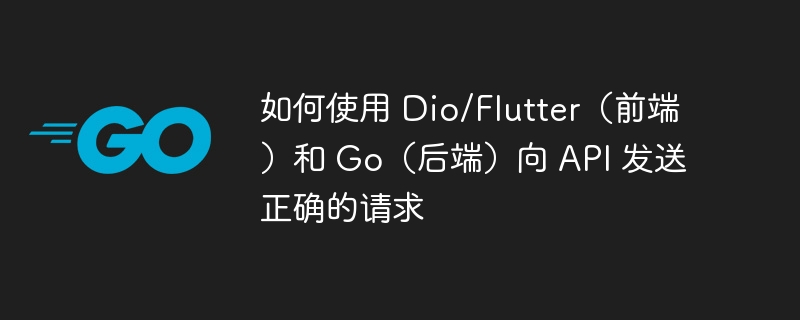
php小編魚仔為您帶來了一個關於使用Dio/Flutter(前端)和Go(後端)向API發送正確請求的指南。在開發過程中,與API互動是不可避免的任務。然而,確保請求的準確性和有效性並不容易。本文將為您詳細介紹如何使用Dio/Flutter和Go來發送正確的請求,讓您的開發工作更加順利和有效率。無論您是初學者還是有經驗的開發者,本文都將為您提供有價值的指導和技巧。讓我們一起來探索吧!
我現在正在 Android Studio 中對此進行測試。這是我嘗試在 Flutter 前端中使用的 Go 程式碼:
func Login(c *gin.Context) {
// Get email and password off of req body
var body struct {
Email string
Password string
}
if c.Bind(&body) != nil {
c.JSON(http.StatusBadRequest, gin.H{
"error": "Failed to read body",
})
return
}
var user models.User
if user.ID == 0 {
c.JSON(http.StatusBadRequest, gin.H{
"error": "Invalid email and/or password",
})
return
}
// Lookup user by email, including records where deleted_at is NULL
if err := initializers.DB.Where("email = ? AND deleted_at IS NULL", body.Email).First(&user).Error; err != nil {
c.JSON(http.StatusBadRequest, gin.H{
"error": "Invalid email and/or password",
})
return
}
// Compare passwords
err := bcrypt.CompareHashAndPassword([]byte(user.Password), []byte(body.Password))
if err != nil {
c.JSON(http.StatusBadRequest, gin.H{
"error": "Invalid email and/or password",
})
return
}
// Generate JWT Token
token := jwt.NewWithClaims(jwt.SigningMethodHS256, jwt.MapClaims{
"sub": user.ID,
"exp": time.Now().Add(time.Hour * 24 * 30).Unix(),
})
tokenString, err := token.SignedString([]byte(os.Getenv("SECRET")))
if err != nil {
c.JSON(http.StatusBadRequest, gin.H{
"error": "Failed to create token",
})
return
}
// Send back
c.SetSameSite(http.SameSiteLaxMode)
c.SetCookie("AuthZ", tokenString, 3600*24*30, "", "", false, true)
c.JSON(http.StatusOK, gin.H{})
}
//main,go
r.POST("/login", controllers.Login)我不斷收到 400 個錯誤代碼,我正在嘗試分析原因。以下是我發送請求的方式:
void postLogin(String email, String password) async {
Response response;
response = await _dio.post('$baseUrl/login', data: {
'email': email,
'password': password,
});
}
...
try {
postLogin(
emailController.text, passwordController.text);
print('Login successful');
} catch (error) {
print('Login failed: $error');
// Print Dio error message
if (error is DioError) {
print('Dio error message: ${error.message}');
}
setState(() {
errorText =
'Login failed. Please check your credentials.';
});
} finally {
setState(() {
isLoading = false;
});
}該 API 在 Postman 中並透過其他測試方法可以工作,但在 Android Studio 中不起作用,至少在我使用 Dio 的方式中不起作用。
感謝您的幫忙。
這看起來像你的問題:
var user models.User
if user.ID == 0 {
c.JSON(http.StatusBadRequest, gin.H{
"error": "Invalid email and/or password",
})
return
}
假設 models.User 上的 ID 只是一個 int,預設總是為零!您可能想要載入用戶,例如在檢查 ID 之前從資料庫中取得。
以上是如何使用 Dio/Flutter(前端)和 Go(後端)向 API 發送正確的請求的詳細內容。更多資訊請關注PHP中文網其他相關文章!




